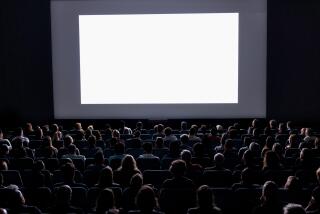China’s U.S. Buying Spree Begins in L.A.
For the staff at the Universal Hilton Hotel, the scene was business as usual: security guards barking into their headphones, holding back angry photographers and frustrated reporters trying to sweet-talk their way into the inner sanctum.
“And I thought the [Golden] Globes were bad,” said an unhappy photographer, one of dozens who couldn’t get into the room Thursday.
But the person everyone was fighting to see -- a diminutive, gray-haired woman in an orange jacket and dark pants -- was hardly your run-of-the-mill celebrity.
On the other side of the velvet rope, Chinese Vice Premier Wu Yi was discussing the very unsexy topic of U.S.-China trade and investment. All the attention could be explained by the goodie bag she had brought to the party: a $15-billion shopping list for U.S. telecommunications equipment, high-tech products and farm goods.
Her appearance, featuring more than a dozen government officials and 100-plus entrepreneurs from China, was the first stop in a cross-country buying spree aimed at easing trade tensions before an April 20 White House summit meeting between Chinese President Hu Jintao and President Bush.
In addition to Wu’s entourage, the Chinese invited dozens of U.S. executives to Los Angeles to participate in a massive contract-signing ceremony. They, along with a large group of Chinese and U.S.-based media, overwhelmed the meeting space.
Analysts said the Beijingorchestrated effort -- the largest buying mission launched by China -- was unlikely to reduce criticism on Capitol Hill unless it was matched by concrete actions on pressing U.S. concerns such as intellectual property piracy and currency policies that critics say favor Chinese traders.
Wu is on her way to Washington for a meeting Tuesday of the Sino-U.S. Joint Commission on Commerce and Trade, where those issues are on the table.
Her delegation was warmly received in Los Angeles by government officials and businesspeople, who hope to benefit from China’s stepped-up commercial diplomacy. Los Angeles Mayor Antonio Villaraigosa and County Supervisor Mike Antonovich joined Wu at the event.
Despite the skepticism about its intent, American executives said the Chinese mission represented real money and an opening into one of the world’s fastest-growing markets.
“Organized chaos” is how Thomas Ripp, president of L3 Security & Detection Systems, described the theatrics. But he said he was thrilled to be part of the signing ceremony after landing a $10-million deal to provide baggage-screening equipment for a new terminal at Beijing Capital International Airport. His Woburn, Mass.-based company, which manufactures its products in Florida, won out against a European firm that has dominated the Chinese market.
“Right now it does help” to be an American company, Ripp said. “The Chinese are looking to increase their trade with the United States, particularly with things manufactured in the United States.”
Yuan Xue Gong, vice general commander of the Beijing Capital Airport Expansion Project, said companies such as Ripp’s were chosen because of technology and price.
But more broadly, he said, his organization and others in the delegation were working hard to “facilitate and improve the commercial exchange” and “improve the understanding” between the two countries.






